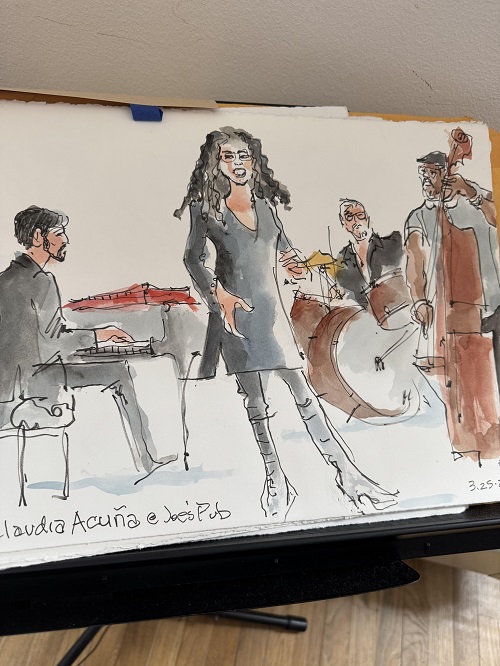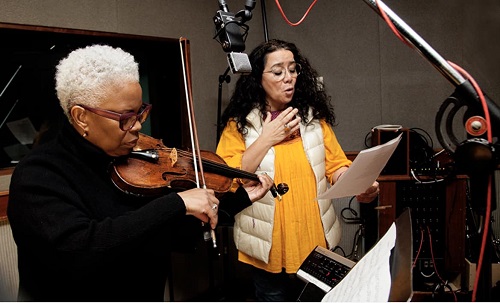Claudia Acuña (Santiago de Chile, July 31, 1971) is a Chilean jazz singer considered the most successful Chilean jazz artist of all time. Since 1995 she has lived in New York, USA.

She is known mainly for singing jazz standards, ballads, and bossa nova, as well as for developing and promoting Chilean folklore in the United States and the jazz world.
Abandoning the traditional jazz standards she covered in her two works for Verve, Chilean vocalist Claudia Acuña reveals a more contemporary Latin sound, with R&B influences, in her Maxjazz debut.
Undoubtedly Acuña’s most personal work to date, Luna once again displays her immense gift for delicately passionate vocals and interesting arrangements. While still using the smooth, sensitive Fender Rhodes keyboards of longtime collaborator Jason Lindner, Acuña sings more in Spanish on his third disc only Lindner’s “Yesterday You and I” is sung in English and eschews any straight-ahead jazz style for an almost fusion approach.
This is not to say it is jazz-pop, but the delicate melodies are reminiscent of 1970s Airto Moreira and the best Al Jarreau.

Although there are few jazz improvisations (most tracks are less than five minutes long), the music remains complex, cultured and sophisticated, with deep harmonies that should please jazz lovers and Latin music enthusiasts alike. Matt Collar.
Claudia Acuña, born in 1971 in Santiago, Chile, is one of the most representative voices of contemporary Latin American singing.
Her music, which fuses elements of jazz and Chilean folk music, has captured the attention of audiences both nationally and internationally.
Claudia has managed to position herself as a key figure in the diffusion of Chilean culture through her art.

Early years and formation
From a very young age, Acuña showed interest in music. She grew up in an environment where Chilean musical traditions were part of everyday life. In her childhood, she began to learn about the guitar and piano, which led her to develop her vocal talent. Claudia Acuña trained in the musical field in various institutions, where she cultivated her love for jazz, a genre that would profoundly influence her throughout her career.
Successes and trajectory
Claudia Acuña’s debut in the music world was well received, which opened the doors to a series of presentations in festivals and concerts in Chile and other Latin American countries.
Her debut album, which includes a fusion of traditional Chilean rhythms and rhythms from other cultures, was acclaimed by critics and audiences alike, propelling her career to new heights.
Throughout her career, Claudia has collaborated with leading musicians and participated in important international festivals. Her ability to perform not only Latin American music, but also jazz standards, has made her versatility recognized by her peers and followers.
The albums she has released throughout her career reflect her love for music and her commitment to creating a unique sound that represents her cultural identity.
Cultural Impact
Claudia Acuña is not only a talented singer, but also a fervent advocate of Chilean culture. Through her music, she seeks to preserve and promote the traditions of her country, and often incorporates elements of folklore in her interpretations.
Her presence on international stages has allowed many people to discover and appreciate the richness of Chilean music.
In addition, she is known for her charisma and energy on stage, which makes her a memorable performer in each of her presentations.
Claudia has inspired generations of young musicians in Chile and abroad, encouraging others to explore their cultural roots and express themselves through music.
Recognitions and awards
Throughout her career, Claudia Acuña has been honored with several awards and recognitions, both nationally and internationally. These awards not only highlight her artistic ability, but also her impact on the music community. Claudia continues to work actively in the industry, collaborating with new artists and participating in musical projects that promote Chilean talent abroad.
Conclusions
Claudia Acuña is a Chilean singer who has left an indelible mark on Latin American music. Her music and her commitment to her country’s culture have established her as a unique artist in the contemporary music scene. As she continues her career, her influence is likely to continue to grow, bringing Chile’s rich musical heritage to new audiences around the world.

Claudia Acuna – Luna (2004)
Temas:
- Esta Tarde Vi Llover (Armando Manzanero)
- Yesterday You and I (Jason Lindner)
- Tu, Mi Delirio (Cesar Portillo de la Luz)
- Arrimate Mi Amor (Pedro Green & Jorge Diaz)
- Historias (Claudia Acuña & Jason Lindner)
- Chorado (Guinga)
- A Meditation On Two Chords (Jason Lindner)
- Oceano (Djavan)
- Yo No Llevo La Razon (Antonio Restucci)
- Lilas (Djavan)
- Carita De Luna (Claudia Acuña & Jason Lindner)
Musicians:
Claudia Acuña (Vocals)
Jason Lindner (Acoustic Piano and Fender Rhodes)
John Benítez (Double Bass and Electric Bass)
Gene Jackson (Drums)
Luisito Quintero (Percussion)
Jimmy Greene (Soprano Sax)
By:
Also Read: From Chile Nairoby and La Casa del Ritmo with their project “Vinyl Plater Productions”
- Toña La Negra The Unequaled Velvet Voice of Tropical Song - December 7, 2025
- Son 14 The History of the Orchestra and the Success of “A Bayamo en Coche” - December 7, 2025
- Compay Segundo The Eternal Patriarch of Cuban Son - December 7, 2025